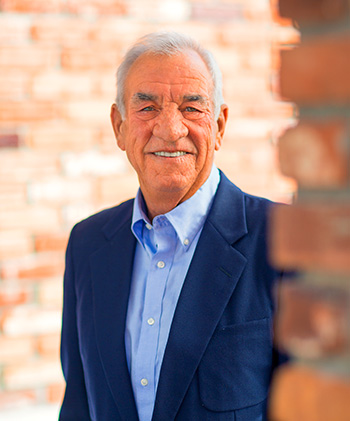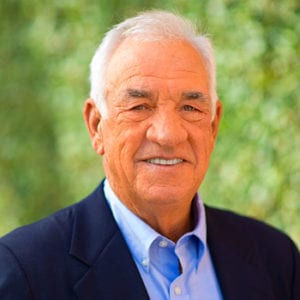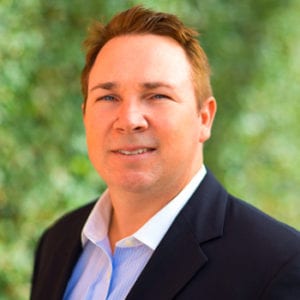A wealth of knowledge to address client needs
A wealth of knowledge to address client needs

Robert (Rob) C. Wayland • Robert (Bob) E. Wayland • Clearwater, FL
Wealth Advisory Group • Kestra Investment Services, LLC
Read full biography below
Bob Wayland: Our goal is to exceed client expectations through a disciplined planning process and a high level of customer service.
The members of our firm are very experienced, and we can bring a wealth of knowledge to helping clients with their specific needs. Two themes we stress with clients are providing a strong value-added proposition and working in a consultative fashion. This is why I established our firm, and we try to live these principles every day.
Rob, do you have any additional thoughts on your practice philosophy?
Rob Wayland: One important facet of our firm is our status as an independent financial-planning practice. While we are backed with excellent resources through our broker-dealer, we are not tied to the products and services of any specific company. Our self-sufficiency and the advisory nature of our firm are vital to our goal of delivering suitable recommendations. It allows us to commit to serving our clients’ specific needs.
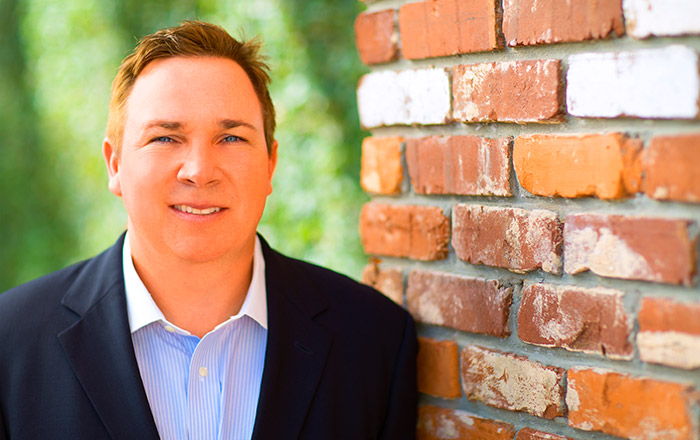
Given the great number of products and services available, retirees can choose from many retirement income strategies, from portfolio-based withdrawal strategies to the potential use of different types of annuities. Evaluating retirement strategies requires objectively analyzing the scenarios and carefully considering what tools to use to evaluate the outcomes to properly fit them into a client’s preference and risk tolerance. This is something we specialize in.
Bob, can you walk through the planning process you use with clients?
BW: We have a disciplined planning process that we believe has served our clients’ needs well. As part of our initial discussions with a prospective client, we will walk them through what to expect in the process and how it can be customized. That consistent road map helps facilitate our delivery of comprehensive advice. It essentially encompasses four phases:
- The first phase is discovery, which begins with our initial meeting with clients. During this meeting, we focus on getting to know clients, identifying their specific needs, and ascertaining what they want their assets to do for them. We spend a lot of time on finding out what’s important to the client from a values perspective—what is truly important in their lives.
- During this phase, we will broadly address where our firm can best help them. We offer a large array of services, including retirement strategies, debt management, tax-advantaged investment strategies, estate planning, risk management, and charitable planning. We are a broad-based firm, and we would like to be the ones who can pull a client’s total needs together and address them in a holistic manner.
- The second phase is strategy. During this stage we seek to develop an effective, long-term strategy that is tailored to the unique needs and risk profile of each client. Our advisors develop a comprehensive plan that outlines the strategy we recommend for long-term success.
- The third phase is implementation. Implementing the strategy often involves coordination with other trusted advisors. The key is clear and frequent communication and providing a process that is transparent and accommodative to the busy lives of our clients.
- The final phase is monitoring and adjusting. We monitor our clients’ accounts regularly to help ensure they are performing in a way that strives to meet their expectations and specific goals. When we discover that a client’s circumstances have changed, or that shifting markets require a different approach, we do not hesitate to recommend appropriate strategic or tactical adjustments.
Rob, can you address the investment piece of the process?
RW: In the early 2000s, we made the move toward the full-service and advisory concept for our firm. This was completed in the following few years when we developed the expertise to design sophisticated portfolio allocations and manage client assets. This frequently includes using the services of third-party investment managers where we think this makes sense.
“We have a disciplined planning process that we believe has served our clients’ needs well.”
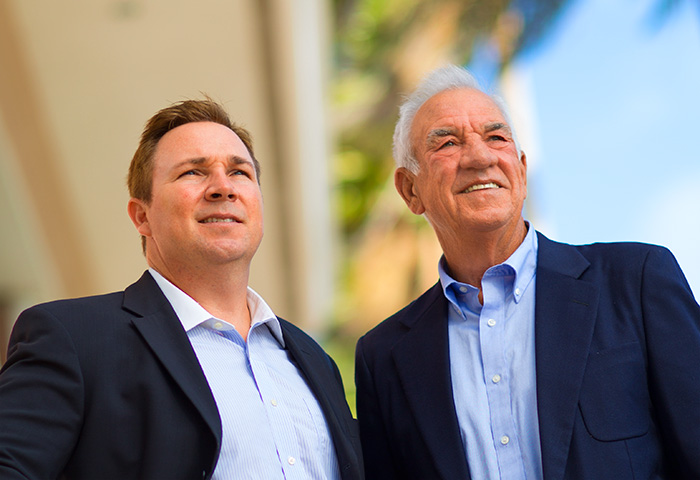
Philosophically, our investment approach has an active investment-management orientation. We are not huge believers in creating an asset allocation and then leaving it fully exposed to risk during the ups and downs of the market. We have all lived through the severe market downturns of the early 2000s and the credit crisis. Those kinds of markets not only have detrimental long-term effects on the accounts of clients, but they can also be especially devastating to the planning time frames for retirees. The psychological and emotional impact can be long lasting for all investors.
To give a broad example, some of our clients in actively managed portfolios had about a 70% cash allocation at the market low point of the credit crisis. These portfolios, through their strategies and methodologies, could react to a declining market situation. We are not trying to time the market for clients, but rather to build portfolios that can be proactive and adaptive using economic and trend indicators. We are not claiming to be able to avoid portfolio losses in a bear market, but we do believe we can construct portfolio solutions that can significantly mitigate losses.
BW: An important aspect of our work with third-party managers is being able to discuss clients on a case-by-case basis with the portfolio manager. We create a “risk budget” for assets that can either be in a conservative or growth bucket. We provide the manager with a good understanding of a client’s goals, risk tolerance, time frames, and drawdown parameters.

When we inevitably face another deteriorating market situation, we can discuss with the manager what defensive moves might be appropriate. We are not generally going to ask clients to sit still with a buy-and-hold philosophy if the signals indicate that markets are heading toward difficult times. We have found that people are willing to give up a little on the upside if we can help lessen the overall risk to their portfolio on the downside—especially many of our wealthier clients. They don’t expect to beat the S&P 500 when the market is up 20% for the year, but they also do not expect to be down 20% in their portfolio when the market suffers those types of losses.
What types of clients do you work with, and what are their broad needs?
BW: I have been in the Clearwater area for more than 40 years and have always been an active member of the civic and charitable communities. This has helped me develop a wide network of contacts, including centers of influence such as attorneys and accountants. As a result, the small-business-owner segment has become a cornerstone of our practice.
Small-business owners are an ideal target for several reasons: (1) they appreciate when value is given and received, (2) they are busy with their own company and understand the wisdom of employing outside expertise for specific needs, and (3) they typically have a wide range of both business-related and personal financial needs, allowing us to build a strong working relationship that can encompass many areas. We might work with them on anything from their company’s retirement plan to their personal legacy and tax-advantaged investment planning.
RW: We also focus on retirement income planning for clients who may not be business owners and who come from a variety of backgrounds and income levels. One area I focus on is developing younger clients. Too many people believe that they do not need to engage the services of a financial advisor until they are close to or in retirement. I try to educate people that nothing could be further from the truth.
The longer we have to work with a client, the better we can help them establish the strong foundations for lifelong financial security. The issues of debt management, retirement, tax and legacy planning, risk management, and education funding are matters that should be addressed throughout one’s working career—not just at or near retirement time. We think this holistic approach to financial and investment planning is a strong attribute for our practice and helps greatly in differentiating our firm.
Bob Wayland is president of Wealth Advisory Group, based in Clearwater, Florida. Mr. Wayland is recognized as a leader in the financial-services industry. He has spoken at many national broker-dealer meetings and at organizations such as the Heritage Institute and the National Network of Estate Planning Attorneys. He has trained financial advisors, accountants, and attorneys on retirement distribution planning and is very knowledgeable on the strategic use of “stretch IRAs.”
A graduate of Bowling Green University with a bachelor’s degree in education, Mr. Wayland founded Wealth Advisory Group in 1994 “with the goal of providing comprehensive financial planning” to small-business owners, business professionals, and retirees. He holds the Chartered Life Underwriter (CLU) designation and is a life member of the Million Dollar Round Table. He is also a member of the National Association of Insurance and Financial Advisors (NAIFA) and the Society of Financial Service Professionals.
Mr. Wayland is married and has three children and five grandchildren. He is active in the Clearwater community and has served on the boards of many local nonprofit organizations.
Rob Wayland brings over 15 years of experience in the financial-services industry and is vice president of Wealth Advisory Group. He is a Certified Financial Planner professional and is a retirement distribution specialist.
Mr. Wayland graduated with honors from the University of Florida with a double major in finance and insurance. Before joining his father’s firm, he worked at Franklin Templeton and Wachovia Bank, and as a wholesaler of retirement distribution strategies. He says his diverse financial background has provided “the knowledge and experience to bring appropriate solutions practices to clients.” Mr. Wayland believes in consultative planning and assists his clients in all areas of financial planning, including investments, asset management, insurance, tax-shelter planning, and overall estate planning.
A longtime resident of the Tampa Bay area, Mr. Wayland is very active in the community. He has held several leadership positions for nonprofits, including president of the local chapter of the Cystic Fibrosis Foundation. He also serves on the Belleair Community Foundation in the town of Belleair, where he resides with his wife and two young children.
Disclosure: Securities offered through Kestra Investment Services, LLC (Kestra IS), member FINRA/SIPC. Investment advisory services offered through Kestra Advisory Services, LLC (Kestra AS), an affiliate of Kestra IS. Wealth Advisory Group is not affiliated with Kestra IS or Kestra AS. Neither Kestra IS nor Kestra AS provides tax or legal advice.
Photography by Steve Widoff

